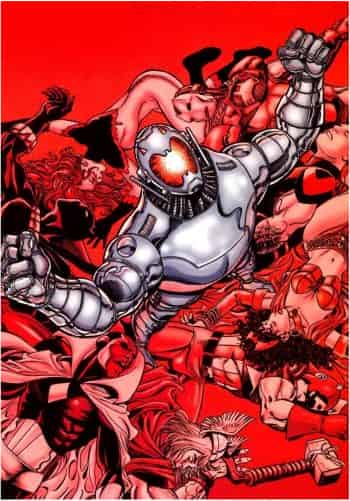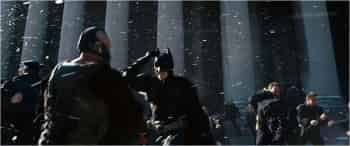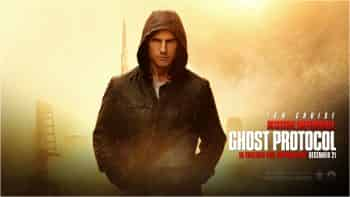
Joss Whedon
The temptation to be pompous—Part II
Joss Whedon said that emotions were the main thing at stake in his movie Avengers: Age of Ultron, and that his source of inspiration was Godfather II. Joss Whedon’s track record is far too impressive for us to be giving him advice. But, if emotion is the main thread, then there was already a goldmine available within the story line itself, in the issue of descendants. Black Widow can’t have children because of her training. Neither can Bruce Banner, but for different reasons. Ultron considers Tony Stark his father, and Vision is in a way, his son. The Avengers stories that inspired the movie (Ultron Unlimited, Avengers vol. 3, issues 19-22) showed Ultron trying to collect a variety of mental schemas to recreate an artificial lifeform, where different points of view could be shared. In sum, we feel the film could have gone into greater depth of feeling instead raising the bar with the physical challenges needing to be solved (saving the world, again).
Focussing on the characters
We’ve already discussed Mark Waid at length, along with his writing techniques focusing on character rather than on large and complex machinations. We feel this is a product of our time. In his analysis of Skyfall, FamousMonster states, “The screenplay, written by John Logan, Neal Purvis, and Robert Wade, is a swaggering return to classic Bond, with an intense focus on characterization and action, as opposed to some of the more recent Bond films, which seem primarily concerned with car chases and stunt sequences” (Movie Review: Skyfall, FamousMonster, http://www.geeksofdoom.com, November 9, 2012).
A few months before, Mendes spoke similarly about the movie: “Yes, they do have a history […]. It’s much more personal story than your traditional ‘I’ve got a nuclear device and I’m going to blow up the world, Mr. Bond.’ […] You know, just making it bigger is not going to make it any more scary” (“We’ve Been Expecting You Mr. Bond,” Dan Jolin, Empire, n° 280, October 2012, p. 94-103.).
Without even being aware of it, Joss Whedon may possibly go in the same direction for his Avengers 2. “On the tone of the film, he [Whedon] said that The Avengers 2 would go deeper instead of bigger. Honestly after a huge battle like the one we saw in the first film, it be nice to get a more personal story and take a step back from the big hefty action. Apparently he wants to go so deep and personal that it will be painful.” (“Joss Whedon Talks ‘Avengers 2′ Script, ‘S.H.I.E.L.D.’ TV Show & Marvel Films,” eelyajekiM, www.geeksofdoom.com, January 11, 2013).
Managing your concepts
In a blog entry on the film Promised Land, François Cardinal made the following comment: “I simply received confirmation for what I have long believed: the environment rarely makes for good writing, simply because the author’s beliefs take centre stage, at the expense of the story. ” [translation]. (« Terre promise : quand la fiction se met au service de l’écologie… », lapresse.ca, Monday, January 7, 2013).
Burlingame, who was covering a number of writing rules, said: “Give your characters opinions. Passive/malleable might seem likable to you as you write, but it’s poison to the audience.” (“Pixar and Joss Whedon’s Rules For Writers,” Russ Burlingame, comicbook.com, December 8, 2012).
We completely agree with both these statements. In fact, we think that when writers give their opinion through their characters, it takes away from the fiction and turns the story into an essay, which is a completely different literary form. It is also a type of fraud toward the readers, to whom the writer promises entertainment, but then slowly attempts to brainwash them with faddish personal beliefs.
We also believe that manipulating ideas must be done very delicately in a work of fiction. In his analysis of the movie, The Dark Knight Rises, Sebala emphasizes that “The Dark Knight Rises suffers so mightily because it substitutes twists for character arcs, convenience for hard choices and flashbacks for discernible themes” (Sound and Fury: ‘The Dark Knight Rises’ Against Theme and Story, Christopher Sebela, comicsalliance.com, July 27, 2012). In this way, a writer’s good ideas can suffocate the story, at the expense of the characters and of the story.
Peppering the story with events to create movement
A few months ago, we watched the fourth installment in the Mission Impossible series, and we couldn’t help but ask, “Why?” with each passing scene: why are all the operations, which are supposed to make the team’s mission move forward, ending up in failure? Especially when another course of action that was possible at the beginning of the scene would have allowed them to achieve the same goal? For example, after their mission to get into the Kremlin to discover a criminal’s identity doesn’t succeed, the big boss then comes along and tells them who the bad guy is. So why take such a roundabout path when a shortcut is available? Certainly, we understand the challenges faced by a writer who has to create an adventure that fits into a given time format. But such a convoluted storyline doesn’t seem a great way to create suspense. As it says in Pixar’s “22 Rules of Storytelling,” “Coincidences to get characters into trouble are great; coincidences to get them out of it are cheating.” (“Pixar and Joss Whedon’s Rules for Writers,” Russ Burlingame, comicbook.com, December 8, 2012).





